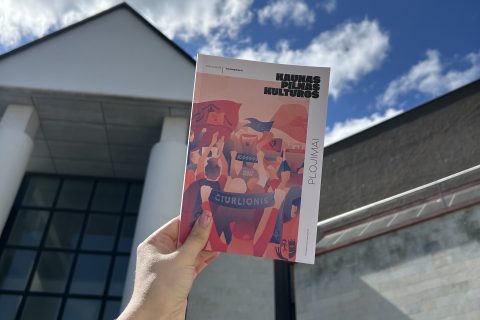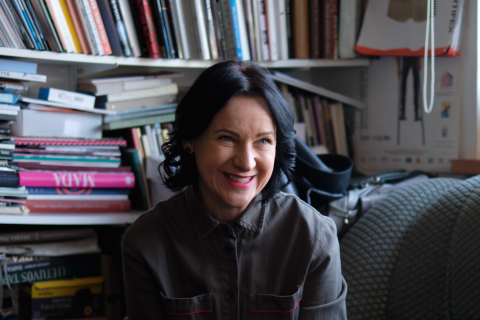The spring wave of awards did not even think of skipping the Kaunas State Musical Theatre this year. An institution that nurtures centuries-old traditions can also be proud of one of the largest teams in the country. Looking at recent premieres and other projects, it is not surprising that more than one talent worthy of applause and congratulations will stand out in a large company.
In March, Fortūnos smiled at the theatricals of Kaunas. Two musical theatre soloists were awarded here. We will soon talk more about Giuseppe Verdi’s opera Nabucco, in which the role of Abigail was created by Gitana Pečkytė, who added one more award to her collection, with the conductor Jonas Janulevičius. But now it’s time to compare two performances that seem very different at first glance but still have a lot in common.
Soloist Marija Arutiunova was given a Fortūna award for two roles created in 2022: Elizabeth in the musical Elizabeth (director Viktorija Streiča) and Lina in the rock opera 1972 (director Kęstutis Stasys Jakštas).
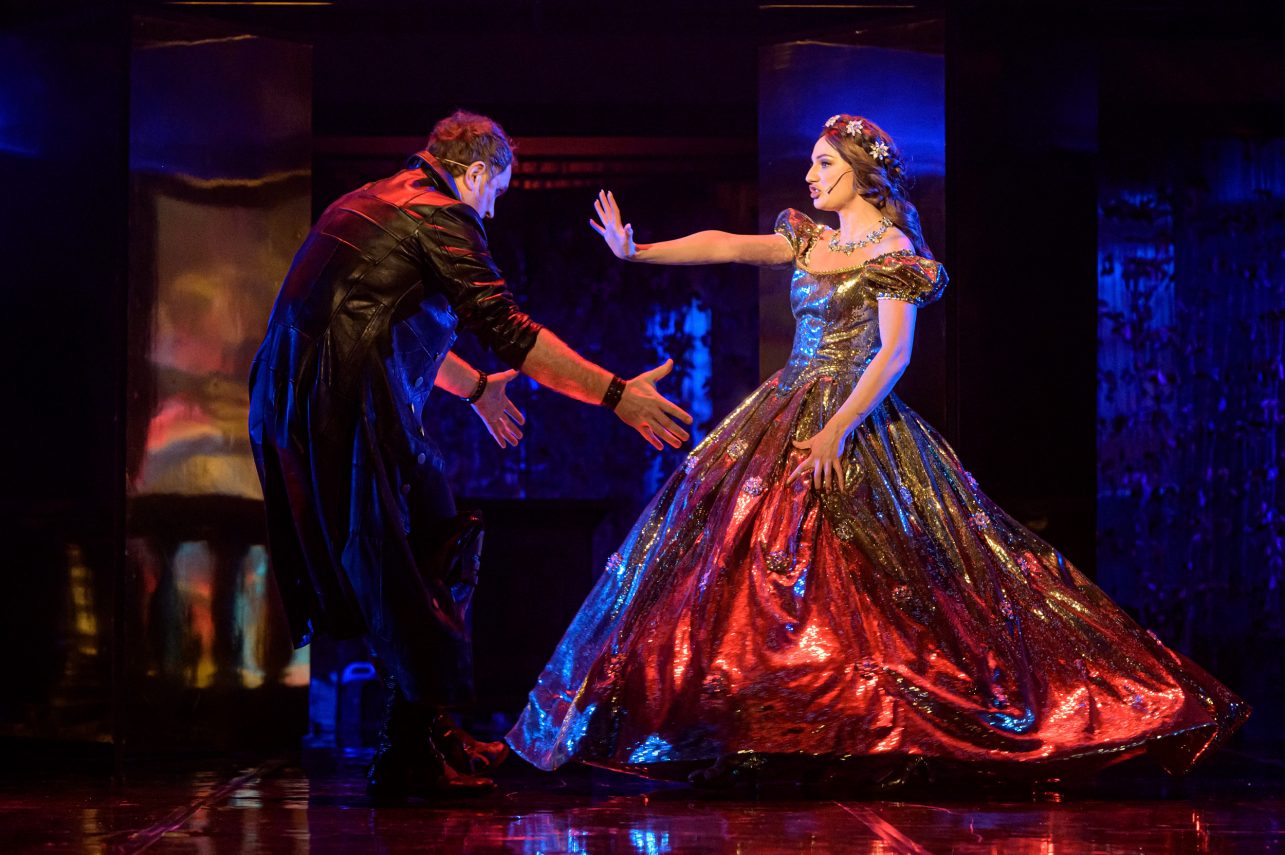
“We experience a short period – the spring of 1972 – in the rock opera and in Elizabeth you can see the entire life of the main character pass by on the stage. It’s hard to say which job is more interesting both were challenging. Imagine, the same heroine in childhood and in old age – it’s not only makeup and costumes, but also body language, and voice, giving a sense to the text. When you are young, everything is easy and fun, but an older person has to spread experience and wisdom,” M. Arutiunova talks about working in the theatre. The young artist opens up that it is impossible to “enact” every day of Empress Elizabeth’s life in three hours, so the most important thing for her was to avoid big jumps while going through the scenes. And the role of Lina in the rock opera 1972 allowed her to delve into nuances and details.
Both Elizabeth and Lina’s characters are based on the personalities and lives of real women. According to M. Arutiunova, this is also a big challenge, because although a theatre remains a theatre, there is less room for interpretation, and you have to lean on the actual facts “Each role unlocks new colors, a new identity in you. Elizabeth allowed me to look at that stage of life that I have not yet experienced, I was forced to mature not only as an actress and singer but also as Marija. I really appreciate that. Like for Elizabeth, the most important thing for Lina from Kaunas is freedom. The empress sought to escape from the clutches of her mother-in-law and the conservative traditions of the court while Lina and her peers dreamed of free Lithuania. Elisabeth loses her son and Lina loses Romas… Emotions take over in both performances. I cannot sing superficially, I am always here and now, I believe in what is happening. I think so does everyone else on stage.”
Interestingly, M. Arutiunova participated in the Fortūnos Awards – which took place at Romuva cinema on March 27 – as one of the performers, so she simply did not have a choice whether or not to attend the ceremony. However, on the eve of the event, when she received a nudge about her attendance being “a must”, a thought crossed her mind that she might be getting a diploma or something. “I did not expect a statuette! On the one hand, an artist always dreams of being appreciated, but I’m on stage for the audience, for the art, not for the awards. Of course, it is very pleasant, it means I’ve reached the audience and the jury. At the same time, it’s also a responsibility. I tell myself that future roles cannot be less powerful than these ones; I want to surpass myself every time. Yes, it is first and foremost the responsibility I have towards myself,” M. Arutiunova reflects.
At the end of March, the winners of this year’s Kaunas City Culture Prizes were also announced. Gabrielė Bukinė, a soloist of Kaunas State Musical Theatre, was awarded for her work of the last two years. Two events and two roles stand out in the calendar: Violeta in Verdi’s La Traviata directed by Anželika Cholina and Donna Fiorilla in Gioachino Rossini’s opera The Turk in Italy. The young woman, who has accumulated a solid number of accolades including nominal scholarships, the final of Kaunas Woman of the Year, wins in international competitions, and her own Fortūna last year – which was particularly dear to her – that the singer received for the aforementioned roles, admits that Violeta is the dream role of many sopranos. She had to prepare for it responsibly and participate in the audition, and the quarantine gave her a lot of time to prepare for that. With Donna Fiorilla it was different, “A different line-up was planned but it so happened that I joined. I had to work fast and in a concentrated manner, get through the musical material, and get into character.”
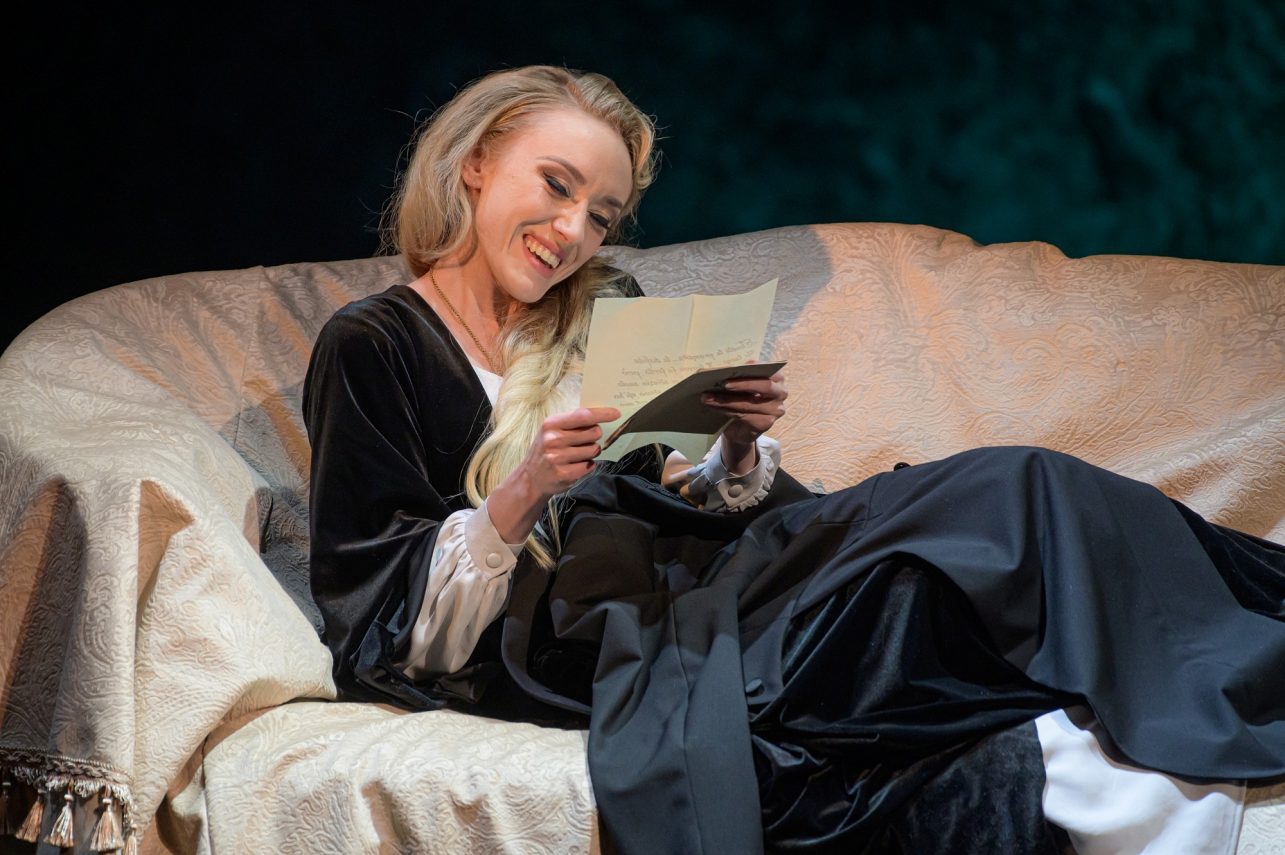
Like M. Arutiunova, G. Bukinė reflects on how the two roles that brought her the award complemented each other, “We were preparing for La Traviata when The Turk in Italy intervened, and the lightness of Rossini’s music answered some questions about Verdi’s music for me. Yes, the works are very different, but I found them to be in harmony with each other.” A. Cholina’s production, according to the Culture Prize winner is surprisingly elegant and should captivate the heart of even the most art-indifferent person, especially as there are hardly any people who have not heard the musical motifs of La Traviata. The Turk in Italy was staged in Lithuania for the first time, with a contemporary twist added by Estonian opera professionals Promfest. “We were not sure how people would react to the idea of incorporating contemporary issues into a classical work. The performance is like a reality show, with technology and bold imagery. But the audience, especially young people, loved it,” the singer says delighted with her colleagues and her own work.
When asked if she has any dreams left after becoming Violeta, the soloist laughs that you never know where another dream role is hiding. “Last summer, we staged Austrian composer Franz Schreker’s early opera Flammen at the Opera Accelerator. We thought, aha, unheard of work, unheard of composer, how will it work? As time went on, and I got into the role, I thought that there couldn’t be more brilliant music! If fate hadn’t arranged it that way, I wouldn’t have known that Flamen was one of my dream roles. Of course, everyone wants grandiose operas, but there are plenty of opportunities to express oneself, which are just as fantastic and enriching,” G. Bukinė believes.
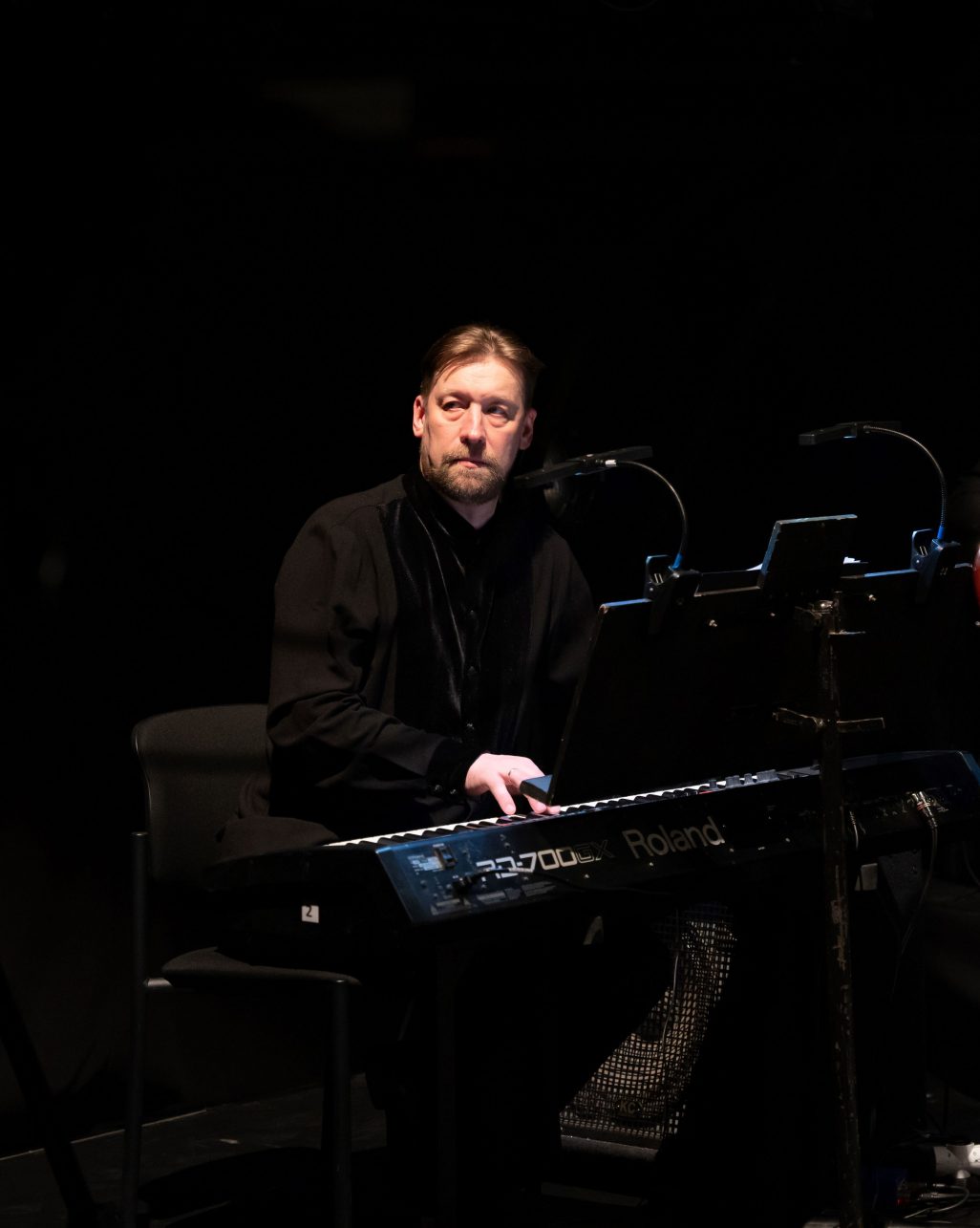
Another interviewee, another title! Jonas Janulevičius, Chief Conductor of Kaunas State Musical Theatre, has been recognized as the most memorable Kaunas artist of 2022 by the decision of the Kaunas City Municipality Commission. He was awarded for his successful creative and artistic work of the past year as well as his active participation in the professional cultural field, which undoubtedly transcends the theatre. Janulevičius, who once called himself a “military leader in a battle”, has a sense of humor that is typical of his profession. When I interviewed him last summer, he joked that he doesn’t shy away from repairing his car during his holidays, because oil therapy is particularly good for his hands! But this time, we talked about believing in the power of music.
“I was nominated for this title before. As I understand, several areas of my contribution to the culture of Kaunas were recognized. I would call it educating the city musically. In addition to my duties at the theatre, I have invested countless hours and creative energy in working with young people. These include the VMU Academy of Music Symphony Orchestra, the J. Naujalis Music Gymnasium Symphony Orchestra, and the project Muzika pučia which has been developed for several years now with composer Zita Bružaitė, and Ąžuolynas wind orchestra.
One wonders why a conductor who has worked with the most interesting classical and daring contemporary productions also finds this demanding activity meaningful. “We can look at it from a personal lens. My eldest daughter has graduated from the 1st Music School, the second from Naujalis, and the youngest is still studying at the latter. I myself have been working there for almost 25 years. I have enough knowledge and experience to help young people take their first steps in the orchestra and provide them with their first critique. I am good at it and when you are, people trust you with work. If you are useful, you must do it, my professional conscience wouldn’t let me do otherwise.”
When asked what musical gift he would like to give to the city if nothing was off limits, Janulevičius points to Venezuela. This country has a unique system of children’s and youth orchestras, called El Sistema, which has given many talents to the world. It is difficult to give a brief introduction, but basically, almost everyone has the chance to play music. “If we could gather the most talented pupils from Naujalis Gymnasium, music schools, J. Gruodis Conservatoire, VMU Academy of Music, and prepare a program with them for a special occasion, in a special place… Imagine a hundred, two hundred musicians, the grandiose Kaunas Youth Symphony Orchestra! So much could be done with them…”
Does the busy artist have time to appreciate more events in Kaunas’ cultural field than just concerts and performances in the musical theatre? Speaking about the past year, Janulevičius singles out the opera Nabucco, the premiere of which, included in the Kaunas 2022 program, took place in the 9th for of the Kaunas Fortress. “Despite the harsh natural conditions, we succeeded, and although I don’t want to praise myself, it was very important for me,” the conductor says. He also mentions the exhibition 1972 curated by Rasa Žukienė at the Kaunas Central Post Office. The exhibition’s aura, reasons, and plot twists had many parallels with the rock opera of the same name. “I feel rather sensitive when it comes to this issue,” the interviewee smiles.
I will not start guessing which of the performances discussed in the interviews the readers had the opportunity to attend. I mostly managed to see all, well, except, perhaps The Turk in Italy, which I should see again properly because I watched only a part of a rehearsal. I have also yet to fill the gap of La Traviata. After seeing Corsage (a film), I am looking forward to attending the sensitive Elisabeth again, and I think it is not for nothing that this musical is a success in many parts of the world. Both Nabucco and 1972 are also in the repertoire of the Kaunas State Musical Theatre. And if you haven’t yet celebrated the New Year in a truly Kaunas fashion with La Traviata, perhaps it’s time to finally do so. Let’s do it together!

